House Bill 979, sponsored by Rep. Brent Powell, would end the state’s prohibition on alcohol.
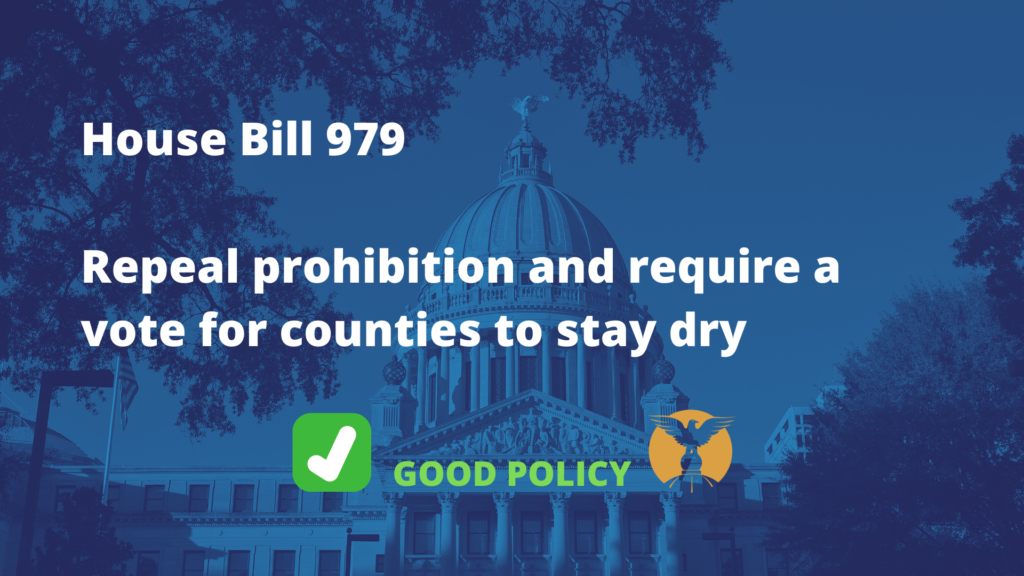
Right now, the state has a patchwork system from the 1966 repeal of prohibition because of local control over alcohol sales. The default setting for counties and cities is dry and changing it requires an election.
This bill would change the default status of counties to wet and require an election for a county to become dry once more. Right now, according to data from the Mississippi Department of Revenue, there are 31 counties in the state. Simpson county was the latest county to go from dry to wet after an election last year. Rankin county is the largest "dry" county in the state, though Pearl, Brandon, and Flowood allow liquor by the glass. Beer is available for sale at grocery stores and convenience stores, but liquor stores are prohibited.
This bill would end the requirement for “qualified resort areas” in dry counties where liquor can be served. The Mississippi legislature has to pass a bill for each area and these bills pop up every year. The counties that don’t want to allow the sale of alcohol will still have the option to remain dry.
Mississippi has many laws on the books that restrict alcohol freedom in the state. Perhaps none is more stifling than the current default as a dry state. This bill would provide for economic growth in the numerous dry counties where residents simply cross county lines to purchase alcohol.
MCPP has reviewed this legislation and finds that it is aligned with our principles and therefore should be supported.
Read HB 979.
Track the status of this bill and all bills in our legislative tracker.
Senate Bill 2830, sponsored by Sen. Josh Harkins, would expand the state’s Right to Try law.

Right to Try laws gives terminally ill patients the ability to try medicines that have not yet been approved by the federal government for market. Mississippi enacted Right to Try legislation in 2015, part of a movement that has swept across the country. To date, 41 states have enacted similar legislation and it became federal law in 2018.
This bill would expand the current list of eligible patients to an individual with a traumatic injury and would also allow adult stem cells as a treatment option.
This would expand upon the current individual freedoms for terminally ill patients who have exhausted their government-approved options and are simply looking for another option.
MCPP has reviewed this legislation and finds that it is aligned with our principles and therefore should be supported.
Read SB 2830.
Track the status of this bill and all bills in our legislative tracker.
House Bill 1210, sponsored by Rep. Dana Criswell, and Senate Bill 2725, sponsored by Sen. Chuck Younger, would allow for the cultivation of hemp in Mississippi. This is currently legal in 47 states.
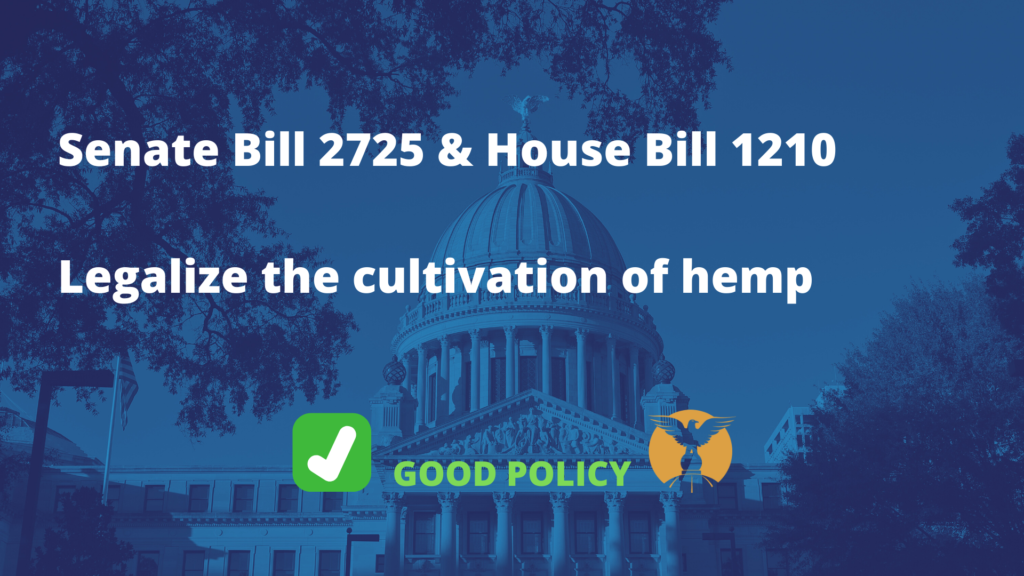
We have seen a massive move toward hemp legalization at the state level after the 2018 Farm Bill expanded the cultivation of hemp. Previously, federal law did not differentiate hemp from other cannabis plants, even though you can’t get high from hemp. Because of this, it was essentially made illegal. But we did have pilot programs or limited purpose small-scale program for hemp, largely for research.
Now, hemp cultivation is much broader, with the Farm Bill allowing the transfer of hemp across state lines, with no restrictions on the sale, transport, or possession of hemp-derived products. There are still limitations, but most states have taken the opportunity to find new markets for those who would like to cultivate hemp.
While law enforcement has raised concerns about the inability to distinguish between hemp and marijuana, that should not distract from the fact that hemp could be an economic boost for many, and something the state should not prohibit.
MCPP has reviewed this legislation and finds that it is aligned with our principles and therefore should be supported.
Track the status of this bill and all bills in our legislative tracker.
House Bill 1214, sponsored by Rep. Lee Yancey, would repeal Certificate of Need laws in Mississippi. CON laws work to stifle competition, limit choice, and raise the cost of healthcare for consumers.
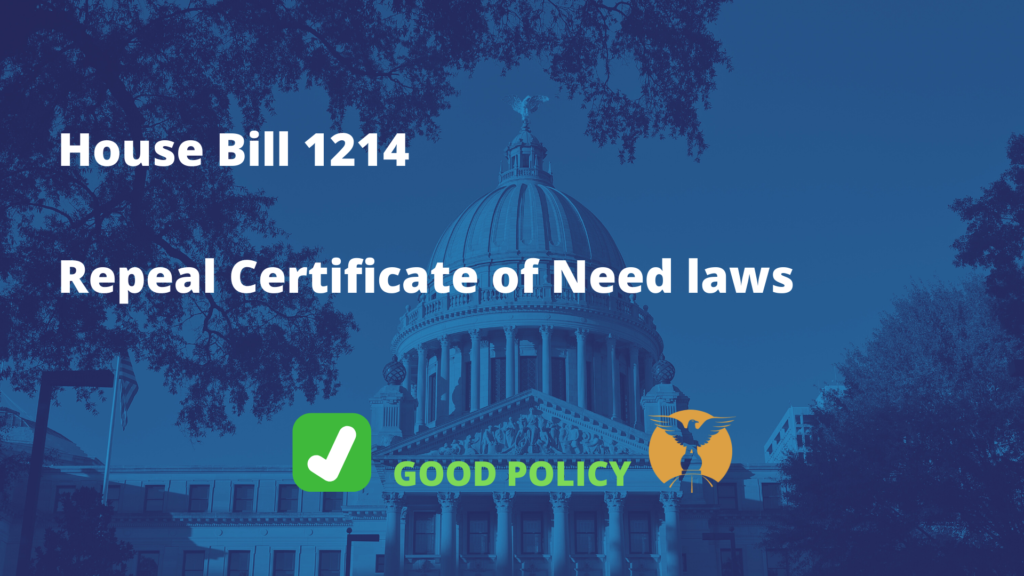
CON laws require would-be medical providers to prove — essentially to their competitors — that their community needs a new facility or service. The equivalent in the computer business would be a law prohibiting a startup (i.e., Apple) from entering the market without permission from IBM. Such a law would have prevented Apple from ever getting off the ground, making the iPhone revolution very unlikely. Just as competition in the computer industry has helped billions of consumers worldwide, repealing CON laws will increase the quality of healthcare for millions of Mississippians.
CON laws are a relic of a short-lived federal mandate that was repealed in 1986. After an initial push in the states to roll back these laws, lawmakers have been reluctant to challenge hospital monopolies. Rising healthcare prices, as well as rapid advances in technology, are encouraging state lawmakers to realize that CONs are harmful. In 2019, Florida repealed its CON law for hospitals and tertiary services. Likewise, Georgia recently reformed its CON laws.
Fifteen states currently have no CON laws. Both the Trump and Obama administrations have strongly urged states to repeal CON laws.
The Mississippi Department of Health is the central planner tasked with administering the state’s CON program. The Department’s CON Review program applies to “the establishment of new healthcare facilities, the offering of defined new institutional health services, and the acquisition of major medical equipment.” Some of the covered services include: Open heart surgery, in-patient rehabilitation services, chemical dependency services, radiation therapy services, diagnostic imaging, nursing home care, home health services, ambulatory surgical services, and long-term care hospital services. In some cases, such as for skilled nursing facilities, no CONs are being issued at all due to prohibitions enacted in the early 1980s.
Recent studies by economist Thomas Stratmann demonstrate that non-CON states have more hospital beds per capita, more rural hospitals, and more access to MRI machines. Stratmann also found that healthcare providers in CON-law states “tend to provide lower-quality services” and that “deaths from treatable complications following surgery and mortality rates from heart failure, pneumonia, and heart attacks are all significantly higher among hospitals in CON states than in non-CON states.”
Far from improving healthcare outcomes for the poor, as some claim, CON laws actually have a disproportionate impact on low-income consumers. They also correlate with negative healthcare outcomes for minorities. Researchers have found no evidence that CON laws result in more uncompensated/charity care — a supposed benefit derived from protecting hospital monopolies in low-income and rural areas.
This bill would require a three/fifths vote for passage.
MCPP has reviewed this legislation and finds that it is aligned with our principles and therefore should be supported.
Read HB 1214.
Track the status of this bill and all bills in our legislative tracker.
Senate Bill 2552, sponsored by Sen. Briggs Hopson, would remove the prohibition on how much alcohol a craft brewery can sell on its premises.
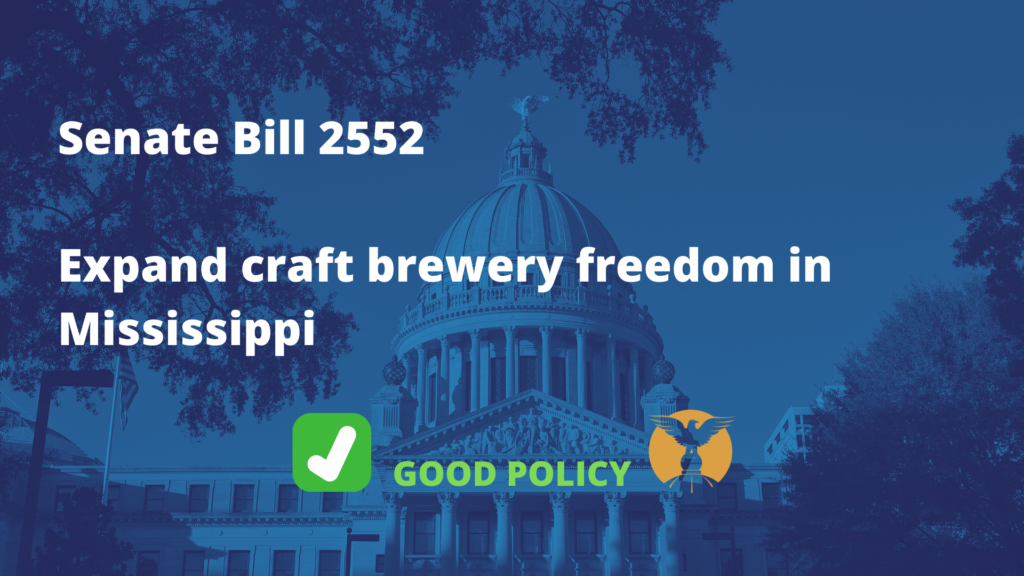
Currently, breweries cannot sell more than 10 percent of what they produced at their own place of business each year. The law essentially limits what a business is allowed to sell. But this was actually a step forward from the prior law that prohibited breweries from selling directly to consumers.
Still, the laws are limiting for consumers, and the state’s economy. Mississippi ranks last in terms of craft beer production. While the industry operates with $650 of economic production per capita in Vermont, it only produces $150 per capita in the Magnolia State.
We can grow the economy by removing regulations and barriers that prevent growth and opportunity. Eliminating this arbitrary cap would be a step in the right direction, and would help the state become a larger player in this growing industry.
MCPP has reviewed this legislation and finds that it is aligned with our principles and therefore should be supported.
Read SB 2552.
Track the status of this bill and all bills in our legislative tracker.
Senate Bill 2531, sponsored by Sen. Walter Michel, and House Bill 981, sponsored by Rep. Brent Powell, would allow the sale of wine in grocery stores in wet counties or municipalities.
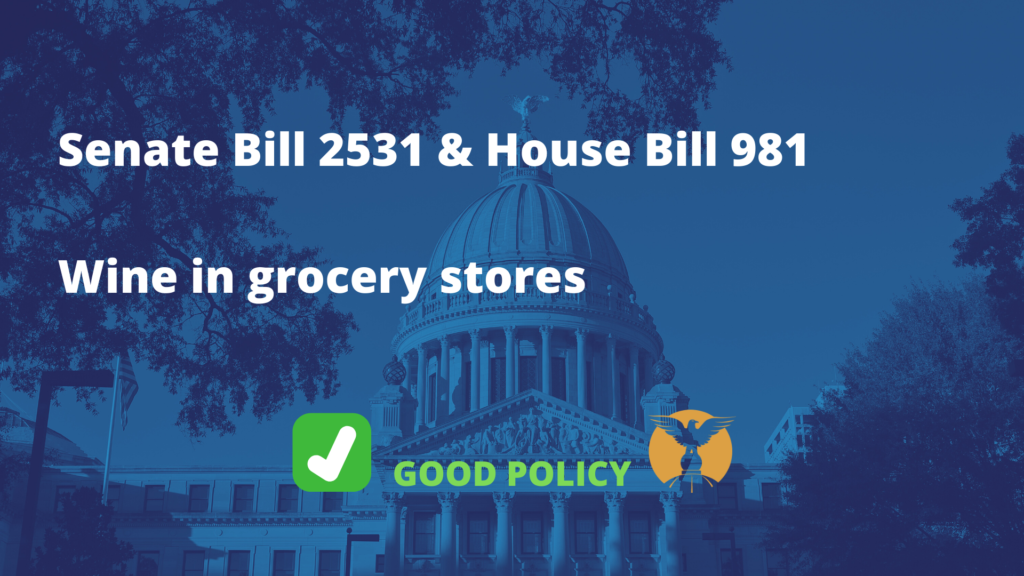
Mississippi is one of a number of states that ban the sale of wine and/ or liquor in grocery stores. In fact, only 20 states allow the sale of beer, wine, and liquor in grocery stores. A handful even ban the sale of beer.
These laws, like all prohibition laws, don’t stop people from consuming alcohol. They just require you to take an extra, unnecessary step. Coupled with the legalization of selling alcohol on Sunday, wine in grocery stores would bring convenience for many busy Mississippians.
These are anti-competitive policies that create a monopoly for liquor stores, not just limiting convenience, but limiting choice for consumers.
MCPP has reviewed this legislation and finds that it is aligned with our principles and therefore should be supported.
Track the status of this and all bills in our legislative tracker.
House Bill 951, sponsored by Rep. Dan Eubanks, would expand food freedom in Mississippi and allow for the sale of raw cow milk in the state.
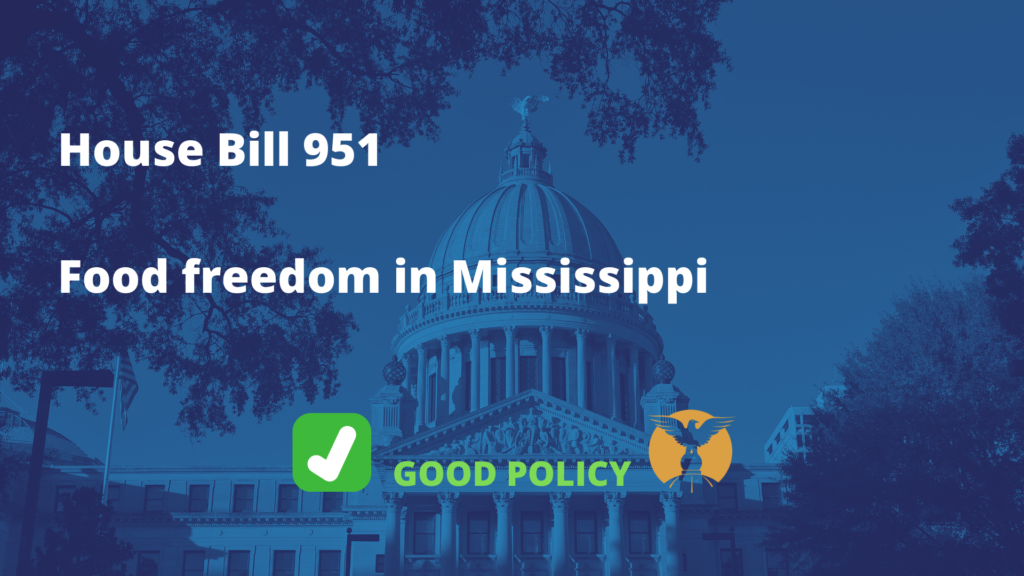
Mississippi currently allows the limited sale of raw goat milk, and that is under fire, while raw cow milk is prohibited. This would expand the sale of raw milk, and also allow for the sale of the milk at farmers’ markets, not just on the farm as the current law states.
The bill would also allow for intrastate sales of agricultural products directly from the producer to consumers and would prevent local governments from restricting those sales.
Mississippi currently has a limited cottage food law, that restricts what you can sell, how you can advertise, and how much you can make. Every state in the country, save for New Jersey, has such a law. Food freedom laws – which are on the books in Wyoming, North Dakota, and Maine – are essentially beefed up cottage food laws that allow for greater access to food for consumers and a new market for entrepreneurs.
MCPP has reviewed this legislation and finds that it is aligned with our principles and therefore should be supported.
Read HB 951.
Track the status of this bill and all bills in our legislative tracker.
Three bills in the Mississippi legislature could allow wagers to be made on sporting events on mobile devices outside a casino property.
Right now, sports betting is only allowed in a licensed casino itself or with mobile devices on casino property.
If one of these three bills —House Bills 172, 941 and 959— became law, it would make Mississippi the sixth state to have full mobile betting. Right now, Mississippi is one of five states that allow partial mobile betting with some restrictions.
The three bills differ only in language and little else. All three bills would have the state collect a fee of six percent of the gross revenue received through the mobile gaming platform and eight percent of all other gross revenues. A mobile gambling app operator would also have to receive a license from the state.
HB 172 is sponsored by state Rep. Cedric Burnett (D-Tunica), who has also authored a bill that would allow casinos in Tunica to relocate inland to reduce their vulnerability.
HB 941 is authored by state Rep. Jeffery Harness (D-Fayette), who has also sponsored a bill that would authorize collegiate student athletes to receive compensation and have legal representation.
HB 959 is sponsored by state Rep. Jay McKnight (R-Gulfport).
Twenty states, plus the District of Columbia allow wagers on sports, with seven of those state legislatures have only recently authorized the practice.
Passage of one of these bills could give Mississippi a competitive advantage in the Southeast. Among Mississippi’s neighbors, Arkansas has legalized sports betting, but only at casinos and not on mobile devices. Louisiana and Alabama have no legalized sports gambling, while a bill to authorize the practice in Tennessee became law in May 2019.
Sports gambling has yet to start in the Volunteer State since regulations are only in draft form.
The Tennessee Education Lottery’s board of directors is scheduled to meet on Wednesday to possibly approve regulations, which would have a $750,000 licensing fee for operators and a 20 percent tax on adjusted gross income.
Tennessee will be an exception nationally since the new law only authorizes online betting since the state doesn’t have casinos.
The legislature approved permanent legislation in 2017 that not only set guidelines for the Gaming Commission to regulate daily fantasy sports, but also struck language from state law that prohibited betting on sports.
The federal ban on sports gaming — except in Nevada — was struck down by a 2017 U.S. Supreme Court decision, Murphy v. National Collegiate Athletic Association.
Senate Bill 2286, sponsored by Sen. Brice Wiggins, would expand the state’s taxpayer-funded prekindergarten program to 25 percent of the state’s 4-year-old children by the 2022-2023 school year.
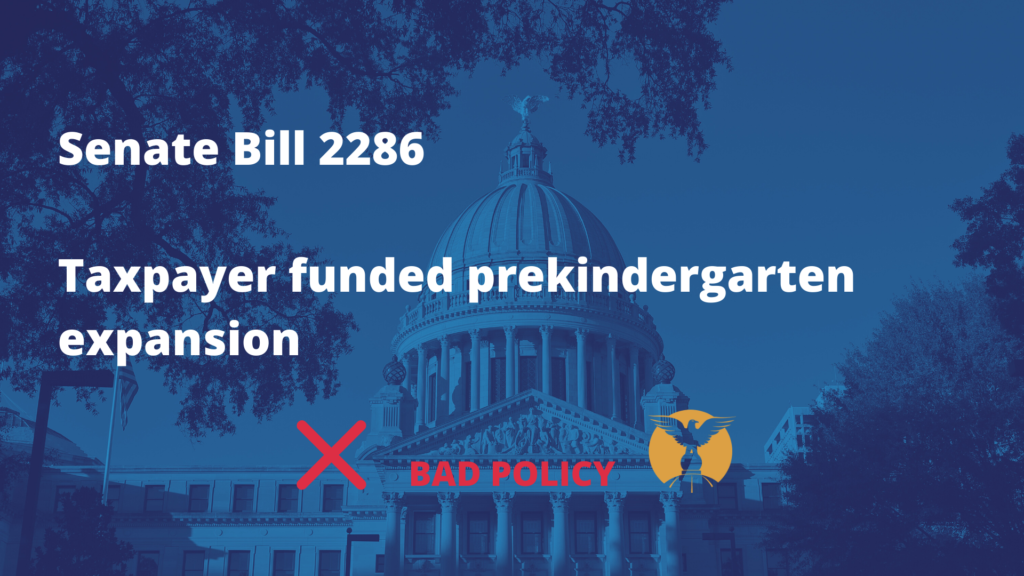
The bill would also increase the amount spent per student from $2,150 per student for a full-day program and $1,075 for a half-day one under present legislation to $2,500 and $1,125 respectively.
There have been countless studies that have shown that while prekindergarten programs can be effective in giving 4-year-olds a boost going into kindergarten and first grade, those positive effects tend to fade away by the time they enter the third grade. One example is a 2019 study of Tennessee’s prekindergarten program. It found that short-term, positive effects on early learners diminished by the time students reach the third grade.
Even the legislature’s own watchdog, the PEER Committee (Joint Legislative Committee on Performance Evaluation and Expenditure Review) is skeptical. In its second report on the state’s taxpayer-funded prekindergarten program since its inception in 2013, PEER said there isn’t enough evidence to conclude whether pre-K programs provide a positive impact. The report also questioned the curriculum used by the state program and whether it had been properly compared against other similar curricula.
One problem with the expansion taxpayer-funded prekindergarten is that it will crowd out private providers, who can’t compete with entities funded with tax dollars. Taxpayers also shouldn’t be footing a bigger bill for a program with questionable results when it comes to early learners.
MCPP has reviewed this legislation and finds that it violates our principles and therefore should be opposed.
Read SB 2286.
Track the status of this and all bills in our legislative tracker.

